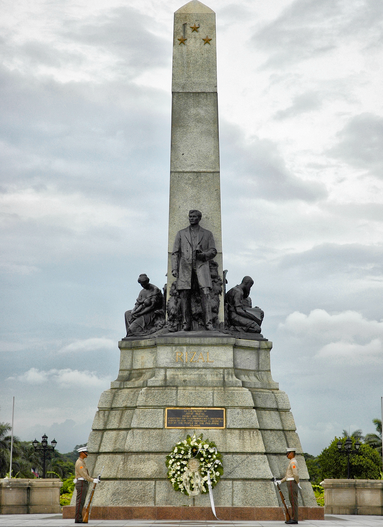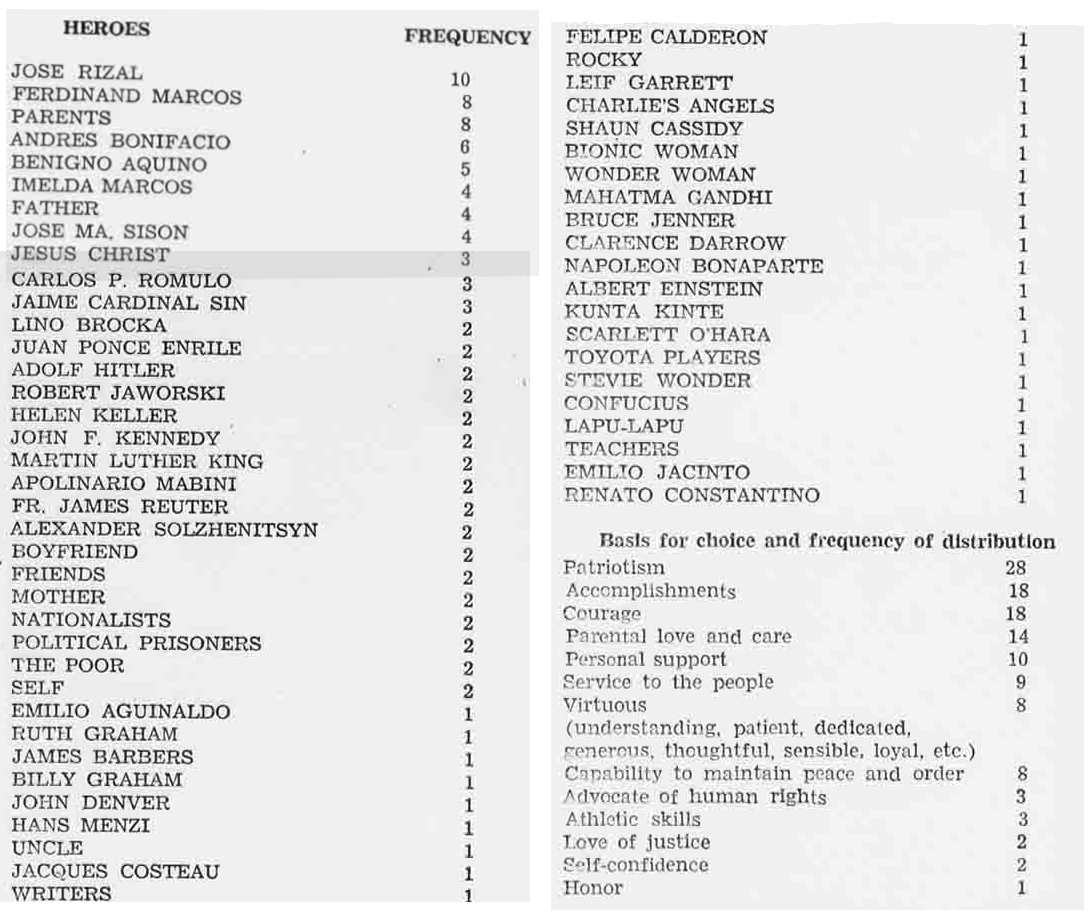The country today commemorates National Heroes’ Day to remember “all Filipino heroes who have braved death or persecution for home, nation, justice, and freedom.”
Arguably the most celebrated among these figures is Jose Rizal, widely regarded by many Filipinos as the country’s national hero.
But contrary to this popular belief, the National Commission for Culture and the Arts (NCCA) says the country has no “official” national hero.
STATEMENT
The notion that Rizal is the country’s national hero is reflected even in most, if not all, school textbooks and references across all grade levels.
For instance, a Grade 5 Filipino textbook prescribed by the Department of Education (DepEd) describes Rizal as the “pambansang bayani (national hero)” in the introductory paragraph for the story “Ang Munting Gamugamo (The Tiny Moth)”:
“Si Donya Teodora ang nagsilbing unang guro ng kaniyang anak, ang ating pambansang bayani na si Dr. José Rizal (Doña Teodora was the first teacher of her child, our national hero Dr. José Rizal).”
Source: Agarrado, P., Francia, M., Guerrero, P. III, Gojo Cruz, G. (2016). Alab Filipino, Quezon City: Vibal Group, Inc., p. 63
A high school learning material about Rizal’s novel El Filibusterismo, used by a private school in Quezon City, also referred to Rizal as “ating pambansang bayani (our national hero).”
Similarly, a biography of Rizal, used as a reference in a University of the Philippines’ PI 100 or Rizal course, described itself as a “classic biography of the Philippines’ National Hero.”
FACT
The Philippines has no official national hero since there is “no law, executive order or proclamation” enacted officially and explicitly proclaiming any Filipino historical figure as such, according to the NCCA, the agency tasked to preserve the country’s cultural heritage.
However, Republic Act 1425, the law requiring Rizal’s life and works be taught in all public and private schools, colleges, and universities, referred to him as “the national hero and patriot.”
In a 2015 explainer, the NCCA said while there is no law that explicitly proclaims him as such, Rizal and a few other figures, such as Andres Bonifacio, have “implied recognition” as national heroes.
In an email dated Aug. 23, Chief History Researcher Alvin Alcid of the National Historical Commision of the Philippines (NHCP), an attached agency of the NCCA responsible for determining “all factual matters relating to official Philippine history,” said:
“[W]e are used to calling [Rizal] our national hero despite any legislation, which for us at the NHCP is a better recognition[,] because it means that the Filipinos have recognized him even without forcing it to us by legislation.”
He added:
“…an official declaration only formalizes it, but the Filipinos have already recognized him as such by ACCLAMATION. We can call him our national hero just like we can call other important historical figures as national heroes because they sacrificed their lives to enjoy the freedom we have now.”
In 2016, House Bill 2762 was filed in the House of Representatives to officially proclaim Rizal and Bonifacio as national heroes, but the bill remained idle in the Basic Education and Culture Committee until the 17th Congress ended last June 4.
In 1993, then President Fidel V. Ramos created the National Heroes Committee (NHC) to “study, evaluate and recommend” Filipino personalities who meet the criteria of a national hero:
- has a concept of nation and aspires and struggles for the nation’s freedom;
- defines and contributes to a system or life of freedom and order for a nation; and
- contributes to the quality of life and destiny of a nation.
In 1995, the committee adopted three “additional criteria for heroes” in its deliberations:
- must be part of the people’s expression;
- thinks of the future, especially the future generations; and
- the choice should involve not only the recounting of a particular episode or events in history, but of the “entire process that made [the] particular person a hero.”
That same year, the NHC came up with a list of nine figures who fit the bill, including Rizal, but its recommendation was never acted upon. The NCCA said this was “probably” because it might trigger a “flood of requests” for proclamations or “bitter debates” involving historical controversies about the heroes.
The NHC was dissolved after it submitted its recommendations, and, since then, “there have been no moves on the part of the Executive Department, nor has the NHCP received any requests, to continue the selection of national heroes,” Alcid said.
In a 2014 media interview, then DepEd assistant secretary (now undersecretary for legislative affairs) Tonisito Umali said the department is “looking into” the said recommendations and that while not one of the recommended personalities has been proclaimed national hero, “their lives as examples and good models for students are being discussed in classrooms.”
(See VERA FILES FACT CHECK: Is Ninoy Aquino a national hero?)
BACKSTORY
In 1901, less than five years after he was executed by firing squad on Dec. 30, 1896, Rizal “had become Philippine National Hero” under the United States colonial government of Civil Governor William Howard Taft “regardless of whether any legislature, Filipino or foreign, had declared him as such.”
American colonizers gave Rizal the title to “win the sympathy of the Filipinos, and to convince them that they were pro-Filipinos more than the Spaniards” in order to have them “conform” to the new government, according to a 2012 NHCP article.
The Taft Commission, according to the NCCA, honored Rizal as the country’s “greatest hero and martyr” by renaming the politico-military district of Morong into the Province of Rizal through Act No. 137 on June 11, 1901.
In September that same year, the commission honored Rizal through the construction of a monument in Luneta, now called Rizal Park. The monument, built through Act No. 243 to commemorate his memory, also houses his remains.
In 1902, the Philippine Commission issued Act No. 345 officially making Dec. 30 — decreed by Gen. Emilio Aguinaldo in 1898 as a “national day of mourning” for Rizal and “other victims of the Spanish government — a holiday called Rizal Day.
Rizal’s reputation as “national hero” was further strengthened when RA 1425 was enacted in 1956, requiring his life, writings and works be taught in all levels of public and private schools in the country.
Sources
Agarrado, P., Francia, M., Guerrero, P. III, and Gojo Cruz, G. (2016). Alab Filipino, Quezon City: Vibal Group, Inc., p. 63
Liwanag, E., Badua, Z., Aranzaso, R. (2011). Alab ng Lahi: El Filibusterismo ni Dr. José Rizal, Quezon City: Vibal Group, Inc., p. iii
Zaide, G. and Zaide, S. (1997). Jose Rizal: Life, Works and Writings of a Genius, Writer, Scientist and National Hero, Quezon City: ALL NATIONS Publishing Co., Inc., Retrieved Aug. 26, 2019 from Jose Rizal Book by Zaide 2nd Ed
National Commission for Culture and the Arts, Selection And Proclamation Of National Heroes And Laws Honoring Filipino Historical Figures, May 18, 2015
Official Gazette, Republic Act No. 1425
Senate of the Philippines, Republic Act No. 10086
House of Representatives, House Bill 2762, Aug. 9, 2016
Official Gazette, Executive Order No. 75
ABS-CBN News, Bandila: Dr. Jose Rizal is not our official national hero?, June 12, 2014
National Historical Commission of the Philippines, HISTORICAL CONTEXT AND LEGAL BASIS OF RIZAL DAY AND OTHER MEMORIALS IN HONOR OF JOSE RIZAL, Sept. 19, 2012
Official Gazette, The Centenary of the Rizal Monument
National Parks and Development Committee, Rizal Monument
Official Gazette, THE 1987 CONSTITUTION OF THE REPUBLIC OF THE PHILIPPINES – ARTICLE XIV
(Guided by the code of principles of the International Fact-Checking Network at Poynter, VERA Files tracks the false claims, flip-flops, misleading statements of public officials and figures, and debunks them with factual evidence. Find out more about this initiative and our methodology.)



